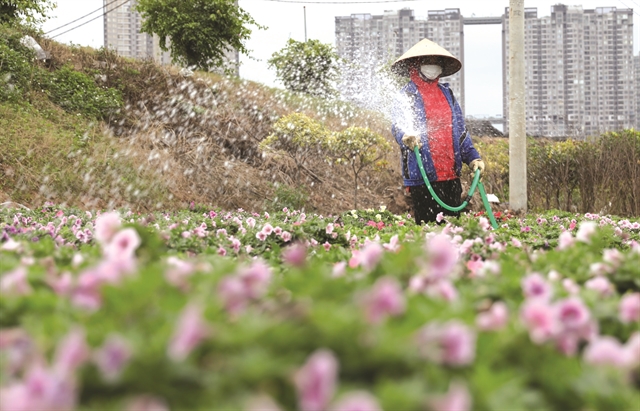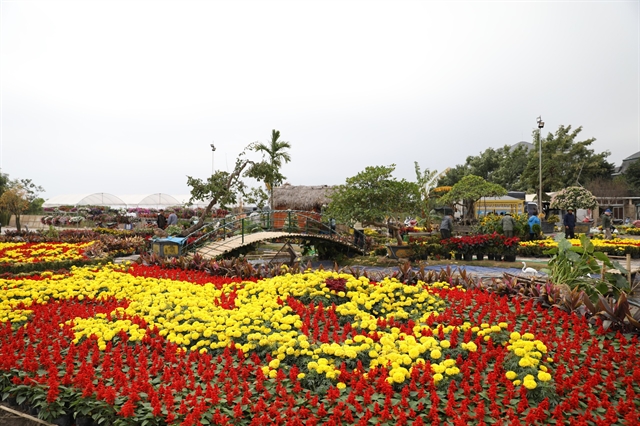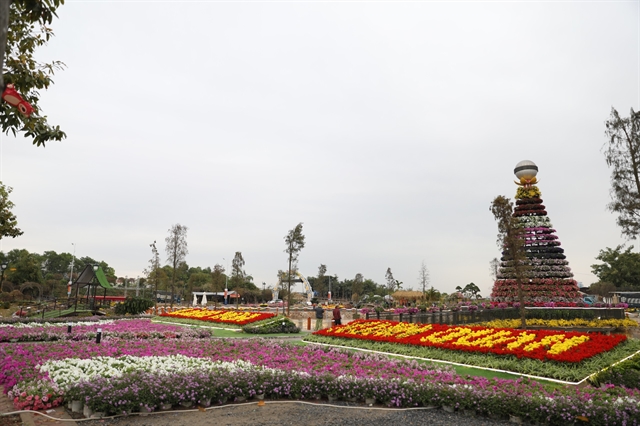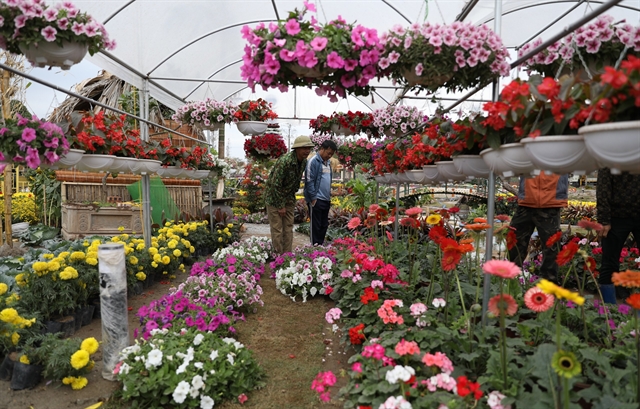Weather:
- Ha Noi 26oC
- Da Nang 27oC
- Ho Chi Minh 28oC

by Nguyễn Mỹ Hà
It's been only a couple of weeks into the new year of 2024, but the people of Xuân Quan Commune have every reason to be positive.
The final week of 2023 saw the commune, which is in Văn Giang District, Hưng Yên Province, but only less than one-hour drive from central Hà Nội, receive a certificate to say it had successfully completed the "New Countryside" goals, which was a nationwide drive to reinvigorate the rural area.
The award ceremony also kick-started the week-long Xuân Quan Flower Show and Exhibition, the third since the commune switched from growing traditional rice, maize and beans to planting flowers in pots, office plants, and landscape trees.
The first day of the Flower Show and Exhibition alone saw more than one thousand visitors from neighbouring provinces turn up. Xuân Quan has been planting flowers for 10 years, and is a much younger flower village than others with longer and richer gardening traditions, such as Mê Linh or Tây Tựu, which are on the outskirts of Hà Nội.
Presenting the certificate to Xuân Quan Commune, Lê Văn Hưng, Communist Party Secretary of Văn Giang District, praised the leadership of Xuân Quan in a nationwide campaign: "The whole country joins hands to build new countryside lives."
"Xuân Quan Commune must continue to complete and maintain the New Countryside model, build transportation infrastructure and cultural centres to increase the quality of life in the commune, and develop safe agriculture closely associated with experience tourism," he said.

Within 10 years, the total investment for New Countryside models in Xuân Quan was VNĐ248 billion (about US$10 million). Today, the commune bears no debt from infrastructure building, and all communal roads have been built with cement or asphalt. Infrastructure for agriculture is new, and other cultural and sporting activities have been enjoyed by more than 70 per cent of the commune residents.
According to reports by Xuân Quan Commune, the resident’s average income reached VNĐ90 million ($3,660) a year, the number of poor households has been reduced to under one per cent, and Xuân Quan’s signature new varieties of petunia have been certified as an OCOP (One Commune One Priority Product) item, ranked with three stars.
The first flower show in the commune took place in 2017 and has been scheduled for every three years, so each of the commune’s 10 hamlets can present their best flowers and ornamental plants in pots.
This year 10 stalls representing 10 hamlets presented more than 50,000 potted flowers and bonsai, which were designed into a stunning array of exhibits, including a giant clock, flower houses, boats and cars, a giant flower waterfall, and a 13-m tall petunia tower made of 500 petunia pots.
Journey to success

Today Xuân Quan has made a success story that other communes of similar modest beginnings want to learn from, but things were not always rum and honey for the local people.
The commune had a darker less stable past when for years. angry, irate farmers petitioned the central government as they thought the local leadership had sold them out.
Only 10 years ago, when the arable land of Hưng Yên Province was mobilised to be used for the Văn Giang urban and commercial centre, furious farmers from Xuân Quan, discontented with the compensation they received, decided to protest. They pulled together to make groups representing their rights and voices to go to government offices in Hà Nội to file their complaints.
In 2022, an award-winning documentary produced by the Hưng Yên Radio and Television retold the troubled scenes in Văn Giang and Xuân Quan, between 2009 to 2014, highlighting the prolonged protests.
At the height of the disagreement, 200 people rented buses to go to Hưng Yên City and Hà Nội to protest. They had doubts about the province's decision to turn 120ha of food crops to plant decorative flowers.
Then Xuân Quan arable land barely gave rice and maize farmers a living income. People thought that if they were left with no land, they wouldn't survive.
Đàm Minh Tâm in Hamlet 4 was one of the protesters. His family and many others felt that the local authorities had given up their fellow farmers' livelihoods.

For some years, the people in Xuân Quan would not plant or work, and only wanted to sue the local leadership.
After many meetings and much policy explanation and clarification, the people finally sat down with the local authorities.
In 2013, the commune’s authorities tried to find a way out of the situation. Xuân Quan had given up its traditional arable land, and they only have 200ha of alluvial land left, which would not bring benefits if they were only using it to plant rice and maize.
Lê Quý Đôn, the then chairman of Xuân Quan People’s Committee [local administration], said that Xuân Quan farmers deserved more compensation, and issued a resolution to use the local alluvial land to grow flowers, bonsai and ornamental plants in pots, which drove the community to economic success.
The first households were given tours to neighbouring flower villages to learn from their experience and find their own new types of flowers to start planting. The authorities also invited agricultural experts from the Việt Nam University of Agriculture to brief Xuân Quan farmers on technical assistance and plant specifications.
Large flower wholesalers in the North were also invited to visit Xuân Quan to hold conferences, conduct market research and study the demands of nearby cities.
Agricultural experts from the Central Institute of Fruits and Vegetables, the Institute of Flowers and Decorative Trees, the Agricultural Genetics Institute as well as agronomists, all focused on Xuân Quan.
Business model
Potted flowers and plants, and decorations for new buildings, offices, and residential complexes gradually became Xuân Quan’s niche.

The local Women’s Union also helped get things up and running. A model farm of 3,600 square metres was planted with flowers and plants planned for new high buildings. Other farmers learned from this model and connected to spread the plantation further. Initial success pulled more farmers into trying the work.
A further 200ha has now been earmarked for smaller farms for more than 1,300 households, not only for local farmers to work on, but to lease to farmers from elsewhere in the North.
In 2014-15, the local authorities pulled together $815,000 investment from public and private sources to build communal roads to make transport to and from Xuân Quan more convenient.
Success from the new flower planting model has driven more people to dutifully work the land, rather than sending angry complaint letters. The strategy worked.
During 2022 and last Tết (Lunar New Year festival), total flower turnover in Xuân Quan reached over $27 million.
“This year we expect to gross a total turnover of up to $30.5 million. One month before the coming Lunar New Year, about 70 per cent of Xuân Quan produce has been sold and gone elsewhere,” said Lê Mạnh Tuyến, deputy chairman of Xuân Quan People’s Committee.
This turnover has been completely generated from the domestic markets. Xuân Quan flowers have not been exported at all.
In 2012 Xuân Quan had 2,500 people of working age without any stable jobs. Now the commune not only generates enough work for its population but also employs up to 1,000 people from other provinces to grow flowers with them.
From being angry farmers worried their rights were being trodden on, the residents of Xuân Quan have learned to innovate and realised that change can be a good thing.
Today they largely live idyllic lives of prosperity, both spiritually and materially, with a new-found love of their land, the outdoors and hard work, from which other places can learn. The commune's fertile success as part of the government's wide-ranging New Countryside programme is richly deserved. VNS

